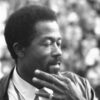calsfoundation@cals.org
Council for the Liberation of Blacks (CLOB)
The Council for the Liberation of Blacks (CLOB) was established in 1969 in Hot Springs (Garland County) and was active for less than two years. It was one of several grassroots civil rights organizations that emerged across the state during a period of unrest due to racial injustices such as segregated facilities, poor housing, and a lack of economic opportunities.
The group was founded by John Paschal (1939–2001), a high school industrial arts teacher. Paschal, who taught at the all-black Langston High School in Hot Springs, was one of the first African-American teachers transferred to the newly integrated Hot Springs High School during the 1968–69 school year.
CLOB got its start one night as Paschal and others—including Ralph Porter Jr., Edward Martin, and Ronald Crutchfield—discussed their frustration at persistent racial injustices. They decided it was time to take action. As the group officially organized, the leadership was made up of both Hot Springs natives and those who had moved into the city, including Paschal (president); Garland Puckett (vice-president); teacher Elmer Beard; Neal Blakely, who worked for the Office of Economic Opportunity; and Edward Martin (secretary), also a teacher; Martin is credited with naming the group. The founders of the organization were all college-educated professionals in their mid-to-late twenties.
On July 7, 1969, CLOB addressed the Hot Springs City Council in the form of a resolution outlining discriminatory practices in the city. In response, Mayor Dan Wolf appointed a biracial committee to study the city’s racial issues. The committee comprised five black and five white members, with most of CLOB’s leadership appointed to the committee. Puckett served as chairman, with Beard as secretary. A city-wide mass meeting was held at the Hot Springs Convention Auditorium, drawing a racially diverse crowd of approximately 800.
In Hot Springs, all the major retail and five-and-dime stores were located along Central Avenue. Although African Americans could shop at the stores, they were not allowed to sit at lunch counters, and no blacks worked at the front of the stores. CLOB canvassed the businesses and negotiated the hiring of African Americans in sales positions. However, store merchants soon wavered in their verbal commitments and subsequently proposed offers of part-time instead of full-time jobs.
In response to the merchants’ actions, CLOB initiated its first demonstration, beginning with the J. J. Newberry Store, where the only black employee was a dishwasher. It was reported as the first demonstration of its kind in the city. After meeting with CLOB, a regional manager for the Newberry Store agreed to hire blacks, and the demonstration ended. The S.S. Kress Store was the group’s next focus, and the targets of the protests grew to include grocery stores and the school administration. The organization also pushed for the hiring of African Americans for federal jobs in agencies such as the U.S. Postal Service and U.S. Forest Service.
In December 1969, the group staged a “Poor People’s Holiday” to demand better wages for hospitality workers during the winter Republican Governors’ Conference. Demonstrators stood across the street from the Arlington Hotel, where Vice President Spiro Agnew was the featured speaker.
In July 1969, CLOB drew statewide attention when 200 black protestors gathered in front of the Hot Springs Convention Auditorium to protest the exclusion of African-American contestants in the Miss Arkansas Pageant. The surprise protest was carried out peacefully, without incident, but the group demanded the entry of black contestants if future pageants were to return to the Spa City. This paved the way for Velma Ann Thomas to become the first black contestant to enter the Miss Hot Springs preliminary. She won and was crowned Miss Hot Springs in 1970, becoming the first African American to compete in the Miss Arkansas Pageant.
Peaceful protest was temporary. Violence erupted on Saturday night, May 16, 1970, and continued into Sunday morning. CLOB had sponsored a community block party, and sometime after 10:30 p.m., a group of white teenagers on West Mountain (situated on U.S. government property) burned a large cross that could be seen for some distance. This was reportedly followed later by gunfire coming from a car driven by white youth in the area of the CLOB block party. Enraged African Americans began damaging white-owned businesses along Malvern Avenue with rocks and bricks. The disturbance continued into the early hours of May 17. A white business owner shot one black man, and several white youths and two CLOB members were eventually arrested.
CLOB continued to sponsor youth events and worked to meet the needs of the community, including work for a local black orphanage. However, less than two years after its creation, CLOB ceased its operations, contributing the balance of its funds to a community daycare center.
During the organization’s brief life, its activism was felt locally and statewide. CLOB successfully changed racial policies in Hot Springs and created job opportunities for African Americans.
For additional information:
“Black Contestant Wins Miss Hot Springs Title.” Hot Springs Sentinel-Record, June 21, 1970, p. 1.
“Black Hiring Restudy Requested.” Hot Springs Sentinel-Record, July 18, 1969, p. 1.
“CLOB Pickets Spa Store.” Hot Springs Sentinel-Record, July 25, 1969, p. 3.
“CLOB Planning Poor Holiday for Governors.” Hot Springs Sentinel-Record, December 7, 1969, p. 12.
“Newberry, CLOB Find Job Accord.” Hot Springs Sentinel-Record, July 26, 1969, p. 1.
“Profiles in Arkansas Black History: Civil Rights in Arkansas, 1950s–1970s.” DVD, June 2009. On file at the office of the Black History Commission, Little Rock, Arkansas.
“Two Junior Klanners Held after Hot Springs Violence.” Arkansas Gazette, May 19, 1970, p. 1B.
Linda McDowell
Little Rock, Arkansas
 Black Power Movement
Black Power Movement Civil Rights Movement (Twentieth Century)
Civil Rights Movement (Twentieth Century) Divergent Prosperity and the Arc of Reform, 1968–2022
Divergent Prosperity and the Arc of Reform, 1968–2022




Comments
No comments on this entry yet.